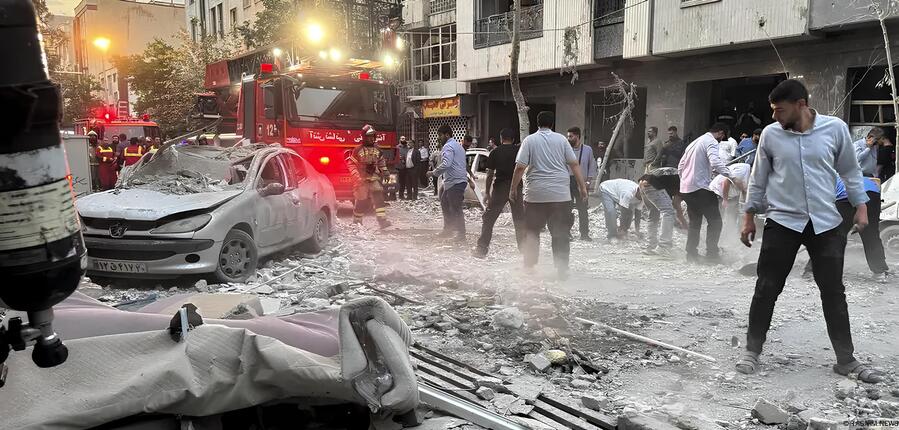Months before Israel launched massive airstrikes on Iran on June 13, numerous reports suggested that the Jewish state was preparing for a direct war with the Islamic Republic. However, the political leadership in Tehran chose to ignore these warnings, resulting in a “surprise” Israeli attack that caused colossal damage to the Iranian military.

Iran is now in what appears to be a hopeless situation. According to reports, Israel has managed to destroy – or at least seriously damage –a large number of its nuclear facilities and kill dozens of top Iranian military officials.
Unsurprisingly, Israel refrains from targeting Iranian political leaders, knowing that as long as they remain in power, Iran cannot avoid catastrophic defeat. With Ayatollah Ali Khamenei and Masoud Pezeshkian in charge, the Islamic Republic has already demonstrated its unwillingness to escalate in response to Israeli actions. Now, even if they intend to take a more decisive step, it is too late.
In September 2024, Tehran turned a blind eye while Israel killed Hezbollah’s entire political and military leadership. Previously, it prevented its proxy in Lebanon from striking Israel with long-range missiles, instead directing it to target empty barracks in northern Israel. That was the time when the Israeli Defense Forces were focused on the war in Gaza in 2023. Once the Jewish state completed a “hot phase” of its campaign in the Gaza Strip, it turned its focus to Hezbollah, destroying the group’s arsenal of long-range missiles. Deprived of its weapons, as well as most of its military and political leaders, the Shiite group no longer posed a serious threat to Israel.
The Islamic Republic’s inaction, therefore, led to the destruction of its most significant proxy in the Middle East. More importantly, Tehran’s passive stance regarding the fall of Syria’s former President Bashar al-Assad has also paved the way for Israel to launch a major military attack on the Islamic Republic. Had Assad remained in power in Damascus, with the Islamic Revolutionary Guard Corps (IRGC) present on the ground in Syria, Israel would have faced far greater challenges in the north.
But the Islamic Republic’s leadership, in coordination with Russia, betrayed Assad. As a result, forces that are de facto friendly (or at least neutral) toward Israel have come to power in Damascus, bringing an end to what was once known as the Axis of Resistance.
Iran is now reaping the consequences of its own leadership’s actions. Its room to maneuver is extremely limited. It cannot count on any of its proxies’ support, as they no longer exist. The only exception is the Houthi Movement in Yemen, although the most they can do is fire ballistic missiles, which Israel will almost certainly intercept.
Another problem for Iran is that, unlike Israel, its aircraft cannot operate in the airspace of neighboring countries, as they would almost certainly be shut down. Also, the fact that Arab countries are intercepting Iranian drones and missiles flying toward Israel clearly suggests that Tehran is on its own in this war.
The Jewish State, on the other hand, has a dual-layer air defense system – one imposed by the Arab nations and one within Israel. Thus, Iran is not in a position to cause serious harm to Israel unless it launches a nuclear strike – although it is questionable whether the Islamic Republic actually possesses any nuclear weapons.
Hypothetically, Iran can respond by striking American military facilities in the Middle East. However, given the very nature of the Islamic Republic and its extremely passive, delayed, limited, and overly calculated approach, it is unlikely to take such a move. Iranian political leadership faces a major dilemma: it must respond strongly, as that is what its population (or at least a significant part of it) expects, yet due to the very policies of this leadership, it lacks the means to do so.
Another problem for Iran is that it cannot even count on its “strategic partner” Russia, as Moscow has a history of turning a blind eye while Israel bombs Iranian military infrastructure in Syria. More importantly, the Kremlin, preoccupied with the war in Ukraine, is not in a position to provide Tehran with air defense systems or aircraft, even if it wanted to. But what should concern Russia is that Iran will no longer be able to provide any assistance to its military, which could affect its adventure in the Eastern European country.
Consequently, Iran and Russia – the axis of the impotent – are on their own against their opponents: Israel, firmly allied by the United States and de facto supported by neighboring Arab states; and Ukraine, strongly backed by the entire Western world.
Under such circumstances, Iran is expected to suffer a major defeat that could have serious consequences for the very existence of the Islamic Republic. Russia, on the other hand, might be able to hold on for some time, although in the long term, its chances of achieving any strategic goals in Ukraine are rather slim. Meanwhile, it is highly unlikely that Russia will seize the moment to turn the situation on the battlefield in its favor. Instead, the Kremlin is expected to ease tensions in Ukraine, allowing the United States to focus more on the situation in the Middle East.
Kyiv, for its part, appears to be taking the same approach as Israel – successfully destroying its opponent’s military infrastructure thousands of miles from its own borders. While Iran, technically, cannot respond to Israel’s strikes, Russia does have the capacity to inflict serious damage on Ukraine. However, there is no political will in the Kremlin to take such action. As a result, sooner or later, Russia may face the same fate as Iran – a defeat from which it could take decades to recover.
If that happens, the Iranian and Russian people will have no one to blame but their own political leaderships.
Author: Nikola Mikovic – Journalist, researcher and analyst based in Serbia.
(The views expressed in this article belong only to the author and do not necessarily reflect the editorial policy or views of World Geostrategic Insights).
Image Source: AFP







